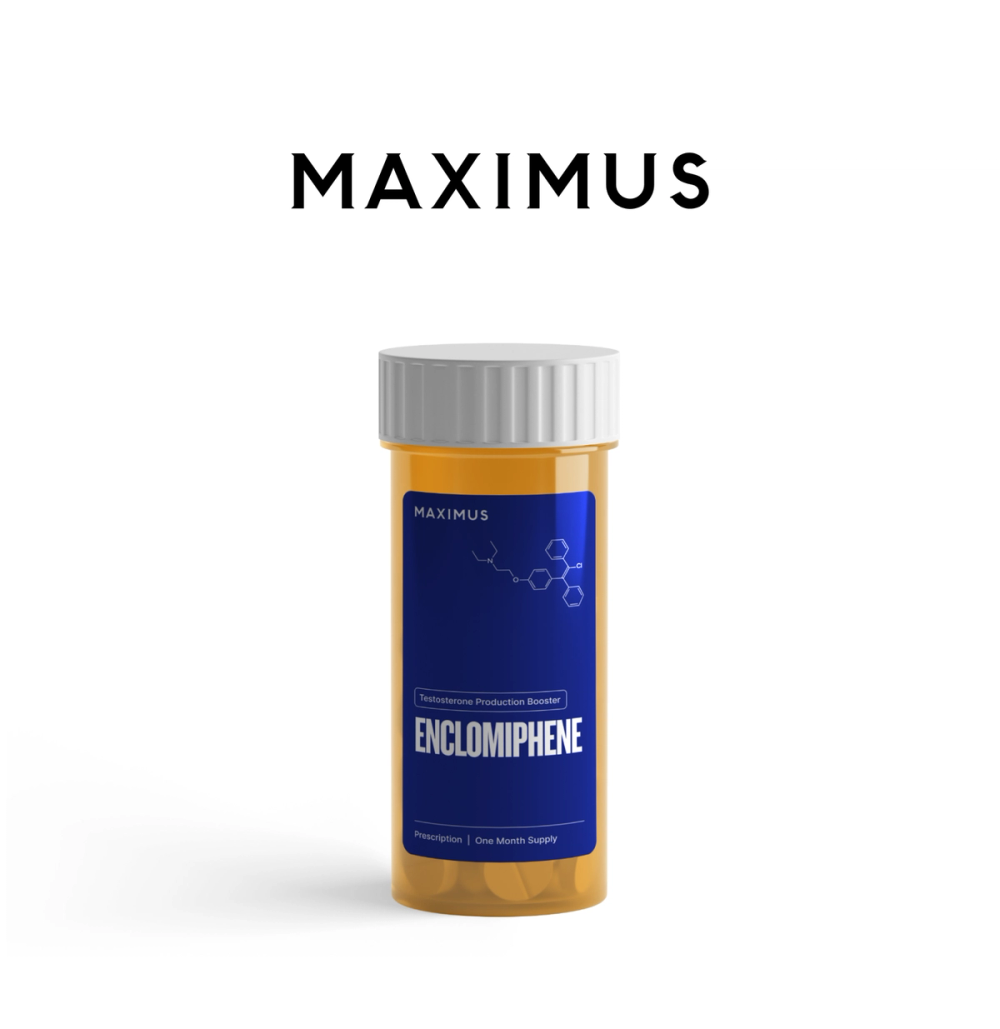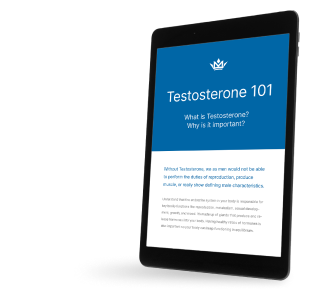Introduction
Enclomiphene citrate is a treatment used to raise total and free testosterone levels while maintaining sperm counts in the normal range. It is the purified isomer of the drug clomiphene citrate, or Clomid, which is approved by the FDA to treat fertility in women, but has commonly been used off-label in men. Many users take enclomiphene as a safer alternative to testosterone replacement therapy to avoid the side effects of TRT, such as testicular shrinkage and decreased sperm production. But does enclomiphene have any side effects of its own? And how long does it stay in your system?
Read on to find out how enclomiphene works, what to expect when taking the medication, and how it compares to Clomid and TRT.
Key takeaways:
- Research on the safety of enclomiphene has found no evidence of drug toxicity. The medication is well tolerated and rates of adverse events do not seem to be significantly different from placebo.
- The medication increases testosterone by blocking estrogen and raising LH and FSH levels without negatively impacting semen parameters.
- Side effects are minimal and range from dizziness observed in just 1% of patients to headaches observed in 3%.
- Enclomiphene is not recommended for people with a history of blood clots, cardiovascular disease, or pituitary adenomas.
What does enclomiphene do?
Enclomiphene citrate is a selective estrogen receptor modulator (SERM), which means it manages how estrogen works in the body. Enclomiphene is considered an estrogen receptor antagonist; it blocks estrogen in the body, which stimulates the production of the hormones luteinizing hormone (LH) and follicle stimulating hormone (FSH). This process helps the body make more of its own testosterone. This is a marked difference from TRT, which shuts down the body’s natural production of testosterone and replaces it synthetically.
The benefits of enclomiphene are the benefits of having more testosterone: more lean mass, increased energy, higher sex drive, and improved mood. The process is fairly quick, too. This study published in the Journal of Men's Health found that taking enclomiphene restored normal testosterone levels in hypogonadal men in as little as 14 days.
Is enclomiphene safe?
Enclomiphene appears to be well tolerated with few adverse effects. And research shows the medication raises LH and FSH levels without negatively impacting semen parameters. In fact, this study found enclomiphene actually increased sperm count in men with low testosterone. Enclomiphene also has a relatively short half-life of 10.5 hours, but the effects on LH and total testosterone persist for at least one week after stopping treatment.
Because of enclomiphene’s safety and efficacy, researchers believe it should “become the primary medication for men with secondary hypogonadism who wish to preserve spermatogenesis.”
Enclomiphene citrate side effects
Research on the safety of enclomiphene has found no evidence of drug toxicity. And rates of adverse events do not seem to be significantly different from placebo. From dizziness observed in just 1% of patients to headaches observed in 3%, the most common enclomiphene side effects were considered minimal in phase II and phase III clinical trials:
- Headache (observed in 3.3% of patients)
- Nausea (2.1%)
- Diarrhea (1.9%)
- Common Cold (1.7%)
- Hot flush (1.7%)
- Joint pain (1.2%)
- Dizziness (1%)
Other potential side effects seen in clinical trials and considered “possibly related” to enclomiphene include:
- Muscle spasms (0.9%)
- Fatigue (0.6%)
- Increased appetite (0.6%)
- Aggression (0.5%)
- Irritability (0.5%)
- Acne (0.5%)
Enclomiphene citrate contraindications
Enclomiphene citrate is not prescribed to individuals with a pre-existing risk for blood clots or those taking blood thinners. In clinical trials, five patients experienced thromboembolic events, although four of them "all had multiple risk factors for thromboembolism" as a pre-existing condition.
If you have a pituitary adenoma, which is a benign tumor on the pituitary gland, you will need to work with their endocrinologist to see if enclomiphene is appropriate for you. If the medication is not suitable, an endocrinologist can help you devise the best hormone modulating therapy for your situation.
Will taking enclomiphene cause hair loss?
Unlike TRT, taking enclomiphene citrate should not cause hair loss. TRT causes an increase of testosterone, but also converts too much of it to the androgenic hormone dihydrotestosterone (DHT) and DHT is the culprit behind the progression of male pattern baldness. While TRT shifts the balance between the two hormones (DHT:TT ratio) towards DHT, enclomiphene maintains balance, making it the more hair-friendly option.
Does enclomiphene raise estrogen?
As an estrogen receptor antagonist, enclomiphene blocks estrogen to increase testosterone. By convincing the body that its estrogen stores are deleted, the medication amps up LH and FSH production, thus stimulating the gonads. In women, this results in ovulation, but in men it results in more testosterone. Studies show enclomiphene actually competes with estrogen for estrogen receptor binding sites, thus limiting suppression of gonadotropin release.
How do enclomiphene side effects compare to Clomid side effects?
Like enclomiphene, Clomid also helps the body make more of its own testosterone by amping up LH and FSH levels. But Clomid consists of a mixture of two isomers: enclomiphene and zuclomiphene. And the two isomers couldn’t be more different.
Zuclomiphene is an estrogen receptor agonist, which means it increases estrogen in the body. This increase in estrogen is thought to contribute to the many side effects associated with Clomid, like mood swings, depressed mood, irritability, anxiety, gynecomastia, and libido issues. Zuclomiphene is also known to stay in your system a long time and accumulates much more over time than enclomiphene.
Though Clomid is commonly prescribed for low testosterone, researchers believe that most of the beneficial effects of the medication are due to enclomiphene, with zuclomiphene contributing “little to the intended outcomes.”
How do enclomiphene side effects compare to TRT side effects?
TRT is often the first-line treatment for low testosterone, but its side effects can be detrimental for those hoping to have kids one day. Unlike enclomiphene, which amps up LH and FSH levels, TRT has been shown to suppress LH and FSH levels, consequently decreasing fertility. In a study comparing enclomiphene to TRT, enclomiphene was found to be just as effective as testosterone therapy while maintaining sperm concentration. For subjects solely on TRT, more than half of them became oligospermic during treatment.
Other side effects associated with TRT include:
- Testicular shrinkage
- Enlarged prostate
- Cardiovascular issues
- Worsened sleep apnea
- Breast growth
- Acne breakouts
- Blood clots
- Dependency
Whether you have low testosterone or you’re curious about the effects of raising your testosterone levels, find out more about how the Maximus Testosterone Protocol can help. Combining prescription enclomiphene with personalized health coaching, the Maximus Testosterone Protocol will allow you to optimize your testosterone without compromising your fertility. The protocol also includes lab testing before and after treatment to ensure it’s the right path for you.
Are there any serious side effects of enclomiphene?
Enclomiphene is a selective estrogen receptor modulator (SERM) used for the treatment of testosterone deficiency in men. While it is generally considered safe and well-tolerated, like any medication, it may have side effects.
Some of the most common side effects associated with enclomiphene include hot flashes, fatigue, acne, and mood swings. These are generally mild and transient, and typically subside on their own within a few days or weeks.
Patients may experience chest pain, shortness of breath, or leg swelling, which could indicate a blood clot. Although safety studies have not shown an increased risk of blood clots with enclomiphene, any of these symptoms should be reported to a healthcare provider immediately.
Enclomiphene has not been associated with an increased cancer risk of any type. Recent studies on clomiphene, a medication used for ovulation induction in women that contains enclomiphene, have reported either a reduced risk or no effect on cancer risk among treated women.
Enclomiphene has demonstrated no irregularities in liver function, and no adverse events have been reported through the FDA's Adverse Event Reporting System. Since enclomiphene is metabolized by the liver via CYP2D6 enzymes, patients with a history of liver problems should be monitored closely while taking enclomiphene, and may require dose adjustments or discontinuation of the medication if side effects from incomplete metabolization arise.
Contrary to common concerns, enclomiphene has been shown to positively influence lipid profiles. Clinical studies have observed significant decreases in total cholesterol and low-density lipoprotein cholesterol in patients using enclomiphene. Patients with a history of high cholesterol or other lipid disorders may find enclomiphene beneficial, as it can aid in managing and improving their lipid levels. Continuous monitoring is recommended to optimally manage and observe these beneficial effects.
It is important to note that the likelihood of experiencing side effects may be influenced by various factors such as age, medical history, and dosage. Additionally, it is recommended that individuals taking enclomiphene should be under the close supervision of a healthcare professional to monitor for any potential side effects and ensure the medication is being taken correctly.
Overall, while it is possible for individuals taking enclomiphene to experience side effects, the likelihood of experiencing these side effects is generally low. It is important for individuals taking this medication to communicate any concerns or changes in their health to their healthcare provider to ensure safe and effective treatment.
Disclaimer: The contents of this article, including, but not limited to, text, graphics, images, and other information, is for information purposes only and does not constitute medical advice. The information contained herein is not a substitute for and should never be relied upon for professional medical advice. The content is not meant to be complete or exhaustive or to be applicable to any specific individual's medical condition. You should consult a licensed healthcare professional before starting any health protocol and seek the advice of your physician or other medical professional if you have questions or concerns about a medical condition. Always talk to your doctor about the risks and benefits of any treatment. Never disregard or delay seeking professional medical advice or treatment because of something you have read on this site. Maximus does not recommend, endorse, or make any representation about the efficacy, appropriateness, or suitability of any specific test, products, procedures, treatments, services, opinions, healthcare providers or other information contained herein. Maximus is not responsible for, nor will they bear any liability for, the content provided herein or any actions or outcomes resulting from or related to its use.








